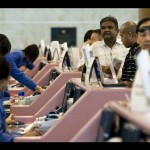Singapore Air, Cathay Pack Planes, Mask Yield Slump
October 6, 2009 by admin
Filed under Related Interests
Singapore Airlines Ltd. and Cathay Pacific Airways Ltd. are flying fuller planes. Profits may take longer to recover.
 Singapore Air, the world’s largest airline by market value, packed an average of 79 percent of its seats in July and August, while Cathay, Hong Kong’s biggest carrier, filled 83.8 percent, beating their averages for the year. Airlines have slashed ticket prices to lure business and leisure travelers amid the worst global recession in six decades as well as taking planes out of service. The discounts have pushed global ticket prices to “profitless levels,” according to the International Air Transport Association, with August premium-class fares 22 percent lower than a year earlier. “It’s better than flying empty planes, but yields are still not strong,” said Christopher Wong, a fund manager at Aberdeen Asset Management Ltd. in Singapore, which oversees about $25 billion of Asian assets. “The worst is probably over, but I am not saying there’s going to be a strong recovery.” Airlines globally may lose $11 billion this year, IATA said last month, widening its June forecast by $2 billion. Asia- Pacific carriers will account for a third of that, the trade group predicted.
Singapore Air, the world’s largest airline by market value, packed an average of 79 percent of its seats in July and August, while Cathay, Hong Kong’s biggest carrier, filled 83.8 percent, beating their averages for the year. Airlines have slashed ticket prices to lure business and leisure travelers amid the worst global recession in six decades as well as taking planes out of service. The discounts have pushed global ticket prices to “profitless levels,” according to the International Air Transport Association, with August premium-class fares 22 percent lower than a year earlier. “It’s better than flying empty planes, but yields are still not strong,” said Christopher Wong, a fund manager at Aberdeen Asset Management Ltd. in Singapore, which oversees about $25 billion of Asian assets. “The worst is probably over, but I am not saying there’s going to be a strong recovery.” Airlines globally may lose $11 billion this year, IATA said last month, widening its June forecast by $2 billion. Asia- Pacific carriers will account for a third of that, the trade group predicted.
Cutting Fares
“It’s easy to fill up a plane because you can cut fares by half, and magically, people will get on the flight,” said Jim Eckes, the Hong Kong-based managing director of industry consultant Indoswiss Aviation. “The question is what kind of money are they making from the tickets they sell? Not much.” Average ticket prices in economy class fell 18 percent worldwide in August, according to IATA. Full-year passenger yields, or the average price a traveler pays to fly one kilometer, may fall 12 percent, led by a 20 percent slump in demand for business travel, the group said. Singapore Air’s passenger yield tumbled 18 percent in the quarter ended June 30, the steepest quarterly decline in at least six years, helping push the airline into a S$307 million ($218 million) loss. The carrier, which gets about 40 percent of its revenue from premium travelers, has said it may have its first annual loss in more than two decades. “The problem has been getting revenue to pick up to where it was before the recession,” Chief Executive Officer Chew Choon Seng said in an interview today. “It hasn’t been a problem filling up the planes.” Yield had a “double digit” drop in the quarter ended September, he added. “The rate of declines has come off,” he added, without elaboration.
Pay Cut
Chew has taken a pay cut, reduced work days and pushed back the delivery of some aircraft. The carrier may post a full-year profit of S$37 million, according to the median of 13 analyst estimates compiled by Bloomberg. That will be the lowest in at least two decades, Bloomberg data showed. Cathay had an operating loss of HK$765 million ($99 million) in the half year ended June, after passenger yields slumped 20 percent. The airline posted a net income of HK$812 million, helped mainly by paper profits from jet-fuel hedges. Chief Executive Officer Tony Tyler, Chairman Christopher Pratt and Chief Operating Officer John Slosar all skipped their 2008 bonuses. Cathay has also asked staff to take unpaid leave, delayed a new cargo terminal and parked planes, as the recession and swine flu pandemic hurt travel demand. There’s “a little bit of improvement in the front end, but pretty much lower yields than we used to have,” Tyler said yesterday.
Capacity Cuts
Not everyone is pessimistic. Carriers have pared excess capacity and cheaper fares are luring passengers, said Steven Lim, who manages about $200 million at Daiwa SB Investments in Singapore. “The capacity cuts are working and it appears that at a certain price, people can no longer hold back on travel,” Lim said, declining to reveal whether Daiwa holds airline stocks. “Travel could start to recover as confidence in the global economy returns.” The recession in the U.S. probably has ended, Federal Reserve Chairman Ben Bernanke said Sept. 15. Asian economies will expand at a faster-than-expected pace this year and next as growth in China, India and Indonesia strengthens, the Asian Development Bank said on Sept. 22. That optimism has helped lift airline shares, with Singapore Air rising 34 percent and Cathay gaining 41 percent this year. The Bloomberg Asia Pacific Airlines Index has advanced 18 percent. Singapore Air gained 1 percent to S$13.24 in the city-state today.
Pricing Power
“With the improved economic outlook, the pricing power of airlines will start to come back and yields will begin to improve,” said Rohan Suppiah, a Singapore-based analyst at Kim Eng Securities Pte. “It may be a slow recovery but nevertheless, still a recovery.” Airbus SAS, the world’s biggest planemaker, last month forecast a jump of 4 percent or more in global air travel next year, after rival Boeing Co. said the market was unlikely to rebound before 2011. In the meantime, carriers are raising or preserving cash to offset the slump. Cathay has agreed to sell a HK$1.9 billion stake in Hong Kong Aircraft Engineering Co. Singapore Air also gave investor shares in a catering affiliate and a smaller cash dividend earlier in the year. Qantas Airways Ltd., Australia’s largest carrier, sold A$500 million ($437 million) of new shares in February. “When you see a storm coming, you will want to protect yourself and build up your capital,” Eckes said. “There’s nothing right now to suggest that there’s any light at the end of the tunnel.”
SOURCE : Reporter Chan Sue Ling in Singapore slchan@bloomberg.net
06 Oct. 2009 (Bloomberg)
http://www.bloomberg.com/apps/news?p…d=aAiaToFIWTv4
















